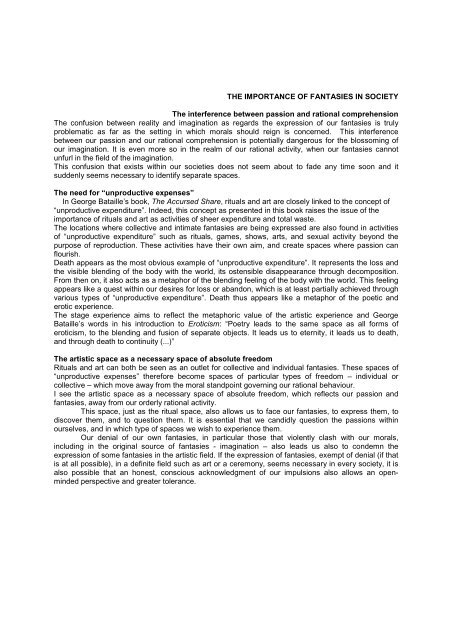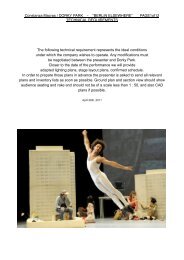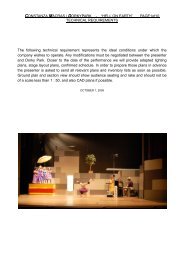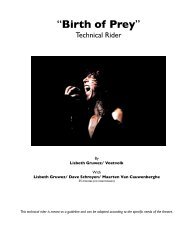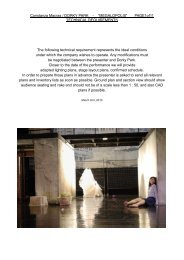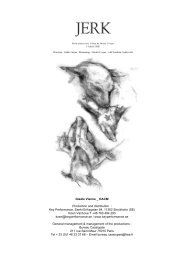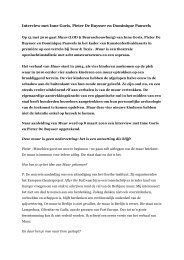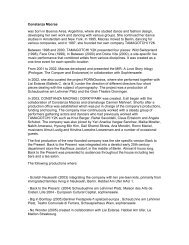Dossier - Key Performance
Dossier - Key Performance
Dossier - Key Performance
Create successful ePaper yourself
Turn your PDF publications into a flip-book with our unique Google optimized e-Paper software.
THE IMPORTANCE OF FANTASIES IN SOCIETY<br />
The interference between passion and rational comprehension<br />
The confusion between reality and imagination as regards the expression of our fantasies is truly<br />
problematic as far as the setting in which morals should reign is concerned. This interference<br />
between our passion and our rational comprehension is potentially dangerous for the blossoming of<br />
our imagination. It is even more so in the realm of our rational activity, when our fantasies cannot<br />
unfurl in the field of the imagination.<br />
This confusion that exists within our societies does not seem about to fade any time soon and it<br />
suddenly seems necessary to identify separate spaces.<br />
The need for “unproductive expenses”<br />
In George Bataille’s book, The Accursed Share, rituals and art are closely linked to the concept of<br />
“unproductive expenditure”. Indeed, this concept as presented in this book raises the issue of the<br />
importance of rituals and art as activities of sheer expenditure and total waste.<br />
The locations where collective and intimate fantasies are being expressed are also found in activities<br />
of “unproductive expenditure” such as rituals, games, shows, arts, and sexual activity beyond the<br />
purpose of reproduction. These activities have their own aim, and create spaces where passion can<br />
flourish.<br />
Death appears as the most obvious example of “unproductive expenditure”. It represents the loss and<br />
the visible blending of the body with the world, its ostensible disappearance through decomposition.<br />
From then on, it also acts as a metaphor of the blending feeling of the body with the world. This feeling<br />
appears like a quest within our desires for loss or abandon, which is at least partially achieved through<br />
various types of “unproductive expenditure”. Death thus appears like a metaphor of the poetic and<br />
erotic experience.<br />
The stage experience aims to reflect the metaphoric value of the artistic experience and George<br />
Bataille’s words in his introduction to Eroticism: “Poetry leads to the same space as all forms of<br />
eroticism, to the blending and fusion of separate objects. It leads us to eternity, it leads us to death,<br />
and through death to continuity (...)”<br />
The artistic space as a necessary space of absolute freedom<br />
Rituals and art can both be seen as an outlet for collective and individual fantasies. These spaces of<br />
“unproductive expenses” therefore become spaces of particular types of freedom – individual or<br />
collective – which move away from the moral standpoint governing our rational behaviour.<br />
I see the artistic space as a necessary space of absolute freedom, which reflects our passion and<br />
fantasies, away from our orderly rational activity.<br />
This space, just as the ritual space, also allows us to face our fantasies, to express them, to<br />
discover them, and to question them. It is essential that we candidly question the passions within<br />
ourselves, and in which type of spaces we wish to experience them.<br />
Our denial of our own fantasies, in particular those that violently clash with our morals,<br />
including in the original source of fantasies - imagination – also leads us also to condemn the<br />
expression of some fantasies in the artistic field. If the expression of fantasies, exempt of denial (if that<br />
is at all possible), in a definite field such as art or a ceremony, seems necessary in every society, it is<br />
also possible that an honest, conscious acknowledgment of our impulsions also allows an openminded<br />
perspective and greater tolerance.


